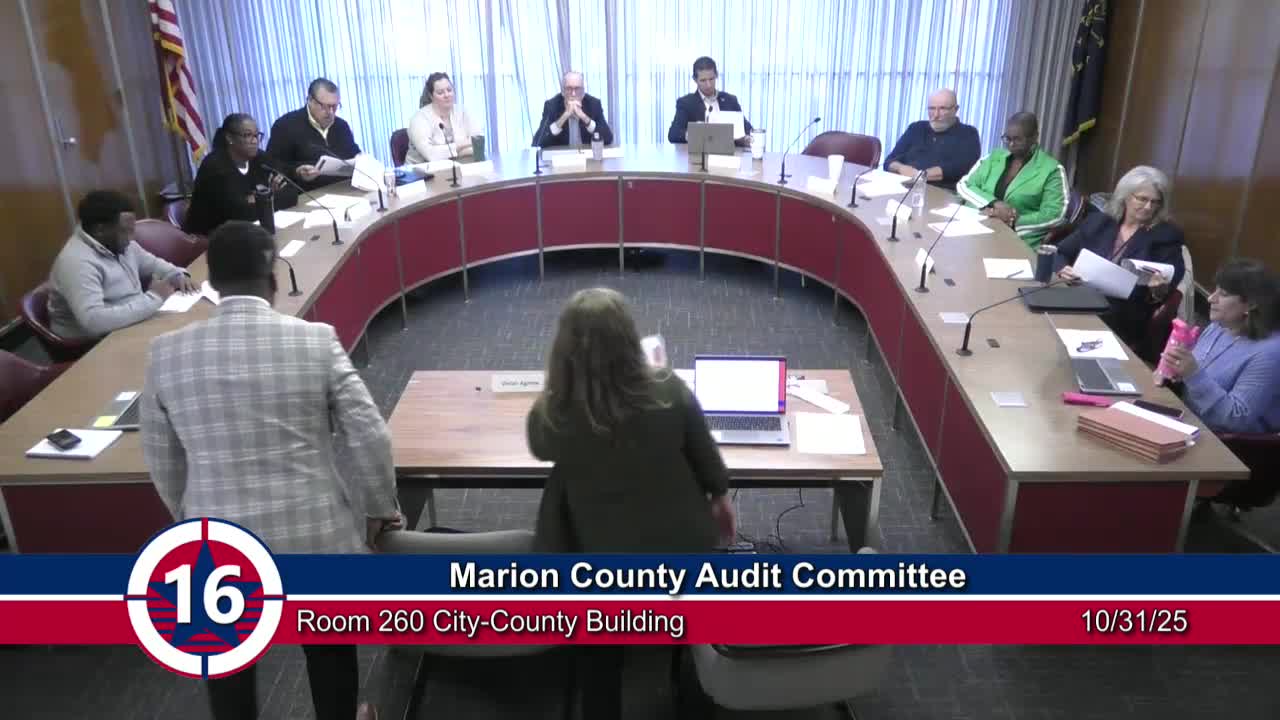Audit office details cash-count findings; performance team reports data-training gains and AI pilot work
Get AI-powered insights, summaries, and transcripts
Subscribe
Summary
Audit manager Heather Jones described cash-count procedures, common control weaknesses and the office's testing scope; performance manager Caitlin Edwards reported that 46 staff completed the IndiePerforms data course in 2025 across 17 agencies and described a new lean continuous-improvement course and an AI Copilot pilot.
Heather Jones, audit manager for the Office of Audit and Performance, gave a detailed presentation on on-site cash-count reviews and common findings, while Caitlin Edwards, performance manager, described the office's data-literacy training and related initiatives.
Why it matters: Cash-handling controls affect financial accuracy and fraud risk across many city and county locations. The audit office's reviews and resulting management action plans aim to reduce errors, improve segregation of duties and update written procedures (SOPs). Performance training aims to build staff capacity to use data for decisions and to standardize processes through Lean tools.
Cash counts and internal controls: Jones said the city-county internal control policy was developed to satisfy State Board of Accounts regulations and is organized around 17 key principles. Cash-count work ties directly to principle 10, which covers payroll, disbursement, receipt, cash and credit-card activities. The audit team uses seven objectives to test compliance, conducts physical cash counts, verifies stamps and other controls, and reconciles counted cash to system-generated reports and deposit records.
Common findings: Jones said the most frequent problems are minor recording errors (often human transcription mistakes), delayed deposits and segregation-of-duties gaps driven by limited staffing, and outdated standard operating procedures. She said many agencies have adopted second-review procedures and updated SOPs after audits.
Sampling and coverage: Jones said the office planned nine cash-count reviews for the year and will likely complete six by year end because of staffing constraints; the audit office breaks reviews down by location (for example, multiple Parks locations) and expects to revisit locations on a approximately three-year rotation. Jones estimated the enterprise has "40 or 50" locations and about eight to 10 agencies that still accept cash, and said the selection process considers last-review date and perceived risk.
Deposit threshold and payment channels: The committee discussed state rules that allow agencies to delay bank deposits until receipts reach a $500 threshold; audit testing accounts for that rule when assessing timeliness. Jones and other staff noted that treasurer operations involve larger dollar volumes and that credit-card and online payments have daily reconciliation processes in place; the audit office said it has not historically included card reconciliation in cash-count testing but may add reviews in the future.
Performance training and data work: Caitlin Edwards summarized the IndiePerforms course, a data-literacy program in which participants must create a visualization as part of completion. In 2025 the office had 46 participants across 17 agencies. Edwards said departments such as Public Works have been heavy users of the training (more than 30 participants and nearly 500 training hours over the life of the program). The performance team added ISA's data-classification training to the curriculum and held office hours for prior participants.
New offerings and AI pilot: Edwards said the office launched a self-guided Lean continuous-improvement course that engaged 96 people in 2025 and is developing a change-management training slated for 2026. Edwards and Director Jones described internal participation in ISA's Copilot cohort as exploratory: staff have used an internal Copilot model for project-management tasks (for example, generating Gantt charts) and are assessing where AI might support workflow without compromising data privacy.
What the office will do next: The audit team will continue cash-count reviews and update the annual entity risk assessment to emphasize qualitative input from agency leaders. The performance team will refresh training content, prepare the Jan. 29, 2026 IndiePerforms symposium featuring participant dashboards and finalize the change-management offering.
Quote: "Our cash counts are designed to answer seven objectives and determine if the agency we're reviewing is in compliance," Heather Jones said. "When we find issues, we work with the agency to develop management action plans."
